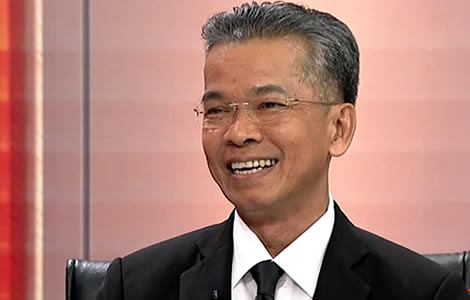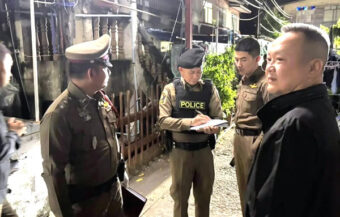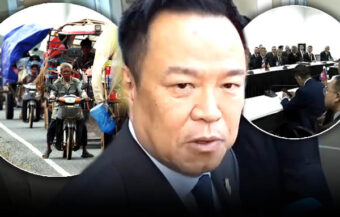The Ombudsman has referred the calculation process for the party list MPs to the Constitutional Court as there were submissions that claimed that the formula being used by the commission contravenes the constitution. The election commission has taken the view that every vote must count while the submissions to the Ombudsman argue that any party that fails to attain 70,000 votes must be excluded from parliament. The latter course would benefit the larger parties.

Moves today have cleared the way for a new Thai government to be formed sometime in June or when the new parliament meets. The announcement by the Office of the Ombudsman that it had rejected a request to nullify the March 24th election came on the same day that the election commission confirmed that the results for all MP seats at both constituency level and through the party list system, will be announced on May 9th. This means that the most likely outcome is that the current Prime Minister will be elected a Prime Minister even if it comes to using Section 270 to resolve the matter when the new parliament meets. The key challenge for the newly elected government, of course, will be how to conduct its parliamentary business in an orderly and efficient fashion. For this, it will need to forge some arrangement and a working majority withe the other parties or MPs.
Relief as prospect of avoided election disappears
There was good news for the prospect of Thailand forming a new government sometime in June this year when the Thai Ombudsman today ruled out applying to the Constitutional Court to have the March 24th election annulled. The move followed a submission from Ruangkrai Leekitwatana, a Thai politician linked to ex Premier, Thaksin Shinawatra. The petitioner had requested that the poll be annulled and raised a number of concerns and grounds for consideration. These ranged from irregularities and mistakes in the vote counting, some of which the election commission has accepted and apologized for, to the failure to include a small parcel of votes from Thai expatriates in New Zealand. The submission also questioned, bluntly, whether the poll had been conducted in a fair and honest fashion.
Ombudsman rejects call to cancel the March 24th poll and finds nothing untoward
The firm response for the Ombudsman was to reject the call. The Secretary General of the Office of the Ombudsman, Raksagecha Chaechai, certainly acknowledged the abnormalities and miscalculations but excused these on the basis that the election commission was endeavoring to provide preliminary results to the public. The election poll in March 24th had generated substantial public interest and a high turn out. The Ombudsman held that the commission had carried out its duties and that there was nothing to suggest anything untoward or unfair in the demanding operation to carry out the extensive poll which took place.
Party list count procedure referred to the Constitutional Court for a legal decision
The Ombudsman did find an issue with a decision by the election commission to calculate the party list votes in such a way that would, in theory, make every vote count. A submission from political activists had suggested that the decision to include parties that had obtained less than 70,000 votes in the calculation of party list seats was a breach of the constitution. This issue has implications as the seats that the election commission proposes to hand to the smaller parties would otherwise probably go to the two large parties namely Palang Pracharat and Pheu Thai.
The Office of the Ombudsman has now referred this matter to the Constitutional Court for a decision.
May 9th is to be election results day
Also on Friday, the election commission has confirmed that it will adhere to the original May 9th date to announce the official results of the election. This is considered by many legal experts to be important. It is also becoming a necessity so as to counter growing political uncertainty and speculation.
One of the election commissioners, Sawaeng Boonmee, said on Friday that election officials are working diligently and that the commission would respect the deadline to announce the vote result. ‘No matter what, the Election Commission must announce the MP results of both systems,’ he said.
Pheu Thai calls for transparency from election commission in finalisation of count
A spokeswoman for Pheu Thai, the pro Thaksin and former ruling party in Thailand, which claims it will still have the largest block of seats in the lower of house of parliament and the right to form a government, has called on the election commission to be open about its operations. Ladawan Wongsriwong said: ‘The Election Commission should proceed with transparency. People should be able to scrutinize them.’
New Prime Minister likely to be Prayut even if it means using Article 270 to win
In the end of the day, as we knew on March 24th, the incumbent Prime Minister will be elected as Prime Minister to lead the next government. This will be the case whatever the outcome of the counts or variations of numbers. Prayuth Chan ocha has the votes to be elected as Prime Minister once Section 270 is invoked. This is really not in doubt despite the political machinations that must take place when the parliament convenes. The question will be the the ability of any new government to legislate in the normal course of parliamentary business and to pass budgets. There is also the danger of motions of no confidence. The objective of the government, which will most likely be formed by the Palang Pracharat Party, will be to put together a working coalition of MPs in the lower house to allow the new Thai government to function.


















